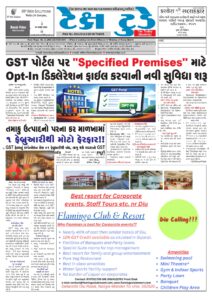GST WEEKLY UPDATE : 53/2023-24 (31.03.2024) By CA Vipul Khandhar
-By CA Vipul Khandhar
- Guidelines for conducting investigation in certain cases – DGGI reg. Investigation that keeps in view ease of doing business (EODB), especially with regular:
· Initiation of investigation and follow-up
- The nature of investigation being taken up by DGGI should not take up a role not assigned in DGGI ZU shall avoid taking up such functions, under provisions of law/rules that more appropriately fall in the purview of return scrutiny or audit, etc.
- A ZU shall normally not initiate investigation related to an aspect leading to tax demand notice on a taxpayer/GSTIN located outside jurisdiction allocated to it in geographical terms.
- In the matter of record-based investigations, the convenience of such taxpayer/entity in terms of location of its head/registered office or accounting office etc. should be considered
- Prior written approval of the DG of SNU if investigation is to be initiated and action to be taken in a case falling under the following four categories, namely case involving (i) matters of interpretation seeking to levy tax/ duty on any sector/ commodity/ service for the first time, whether in Central Excise or GST; or (ii) big industrial house and major multinational corporations; or (iii) sensitive matters or matters with national implications; or (iv) matters which are already before GST Moreover, for cases of the category (iii) or (iv), before any precipitative action is taken in investigation.
Summons
- In initiating investigation with respect to a listed company or PSU or Corporation or Govt /agency or an Authority established by law, or seeking details (that are record-based and/or are reflected in statutory books of account or filings) from them, the practice to be adopted by DGGI should be of initially addressing official letters (instead of summons) to the designated officer of such entity (detailing the reasons for investigation, and the legal provisions therefore) and requesting the submission of the relevant specified details in a reasonable time period which should be mentioned in the letter.
- An investigation initiated must reach the earliest conclusion which is not more than one It is not necessary to keep investigation pending till limitation in law approaches. Show cause notice should not be delayed after conclusion of investigation. The closure report consequent to the appropriate payment of government dues by the person concerned should also not be delayed and should have a brief self- explanatory narration of the issue and the period involved. Expeditious actions without delay at these stages are part of preventive vigilance ensuring that no room remains for malpractices.
- Conclusion of investigation may also take the form of recording that investigation is not being pursued further as nothing objectionable was found in. There may be situation where there is simultaneous record-based investigation of a taxpayer by more than one office on different subject matters. It is relevant that a GST amount, if any, involved, can be collected only once and often such investigations may call for substantially the same set (or subset) of underlying information/documents.
- Therefore, when, in a case initiated by DGGI, it comes to notice that CGST Zone and/or State GST are also looking at the taxpayer, then the Zonal Unit must dialogue with other investigating office(s) and consider feasibility of one of the offices pursuing all these subject matters with respect to the taxpayer. If this outcome is not feasible, the reasons therefor should be confirmed by DG of the SNU.
- In terms of sub-para (f) (I) of para 3 above, or otherwise, the scenario may arise where an issue investigated by DGGI is based on an interpretation of CGST Act/ Rules, notifications, circulars etc, and it is in the direction of proposing nonpayment or short payment of tax, however, the background is that the taxpayer(s) is/ are following, or have followed, a prevalent trade practice based on particular interpretation that is followed on that issue in the sector/industry. This scenario results in more than one interpretation and likelihood of litigation, change in practice, etc.
- Therefore, it is desirable that the concerned DG make a self-contained reference, after suitable consultation with other SNUs and with approval of the DG, to the relevant policy wing of the Board i.e. the GST Policy or TRU. The endeavour, to make such reference before concluding investigation, and as much in advance, as is feasible, of the earliest due date for issuing of show cause notice, may be useful in promoting uniformity or avoiding litigation if the matter, after being processed, is amongst those that also gets placed before the GST Council.
Grievance redressal
The Additional/Joint Director (Admn.) of ZU is Grievance Officer whom taxpayer may approach (through letter, email or by appointment) with grievance, if any, related to an ongoing investigation, for appropriate redress. In case the reasonable grievance persists, the Pr. ADG/ADG of ZU may consider meeting, by appointment, the taxpayer.
In conclusion, adherence to these guidelines is essential for maintaining the integrity of investigations, ensuring fairness, and upholding the principles of ease of doing business in the taxation framework.
- AAR & Important Judgements:
(i) Hon’ble Madras High court Decision Regarding Failure to Reflect RCM in GSTR 1 rectified in GSTR 3B and GSTR 9:
(Applicant – Amarjyothi Carrying Corporation)
Madras HC quashes GST Assessment Order In the case of Amarjyothi Carrying Corporation vs Assistant Commissioner (ST), the petitioner challenged an order dated 28.07.2023 primarily on the grounds of lack of reasonable opportunity. The case pertains to errors in filing GSTR-1 for October 2019, which were rectified in subsequent returns, GSTR 3B and GSTR 9. The petitioner, a registered entity under GST laws, operates in the transportation of goods sector. It was discovered that while filing the GSTR-1 return for October 2019, the petitioner failed to indicate GST leviable on reverse charge basis for services provided. However, this error was corrected in subsequent filings of GSTR 3B and GSTR 9.
The petitioner contends that they were unaware of the proceedings initiated regarding the GSTR-1 return until the impugned order was issued. They subsequently provided an explanation for the inadvertent error along with relevant documents, seeking another opportunity to rectify the issue.
Held: Considering the petitioner’s argument that the entire tax liability arose due to an inadvertent error rectified in subsequent returns, the court quashed the impugned order. It remanded the matter to the respondent for reconsideration, directing them to provide a reasonable opportunity to the petitioner, including a personal hearing, and issue a fresh order within two months.
(ii) AAR On Perquisites provided by employer to employee under contractual agreement would not be considered as Supply under GST:
The Gujarat AAR in the matter of Advance Ruling No. GUJ/GAAR/R/2024/03 held as under:
Observed that, in terms of Circular No. 172/04/2022-GST dated July 06, 2022, it is clarified that perquisites provided by the ’employer’ to the ’employee’ in terms of the contractual agreement entered between the employer and the employee, will not be subjected to GST when the same is provided in terms of the contract between the employer and employee. There is no dispute as far as the canteen facility is provided by the Applicant as mandated in Section 46 of the Factories Act is concerned. The Applicant had provided a sample copy of the HR Manual. In view of the foregoing, the deduction made by the Applicant from the employees who are availing food in the factory would not be considered as a ‘supply’ under the provisions of Section 7 of the CGST Act. Since the answer to the above is not in the affirmative, the ruling sought in respect of the second question is rendered infructuous.
Relied on, the Ruling of the Gujarat Appellate Authority for Advance Ruling in the case of M/s. Tata Motors Ltd, Ahmedabad [Order No. GUJ/GAAAR/Appeal/2022/23 dated December 22, 2022], wherein it was held that the ITC on GST charged by the CSP will be restricted to the extent of the cost borne by the Applicant only.
Held that, that ITC will be available to the Applicant in respect of food and beverages as canteen facility is obligatorily to be provided under the Factories Act read with Gujarat Factories Rules, 1963 as far as the provision of canteen service for employees is concerned.
In conclusion, the Gujarat AAR’s ruling in the case of Kohler India Corporation provides clarity on the GST treatment of employer-provided perks, specifically relating to canteen facilities. The exemption of such perks from GST, coupled with the eligibility for Input Tax Credit (ITC) within specified limits, offers significant implications for businesses operating under similar arrangements. This ruling underscores the importance of contractual agreements and compliance with statutory mandates in determining GST liabilities and entitlements, offering guidance to employers and service providers alike in navigating GST complexities.
Disclaimer:
This publication contains information for general guidance only. It is not intended to address the circumstances of any particular individual or entity. Although the best of endeavour has been made to provide the provisions in a simpler and accurate form, there is no substitute to detailed research with regard to the specific situation of a particular individual or entity. We do not accept any responsibility for loss incurred by any person for acting or refraining to act as a result of any matter in this publication.
(Author is a well known Chartered Accountant practicing in the field of taxation at Ahmedabad)




